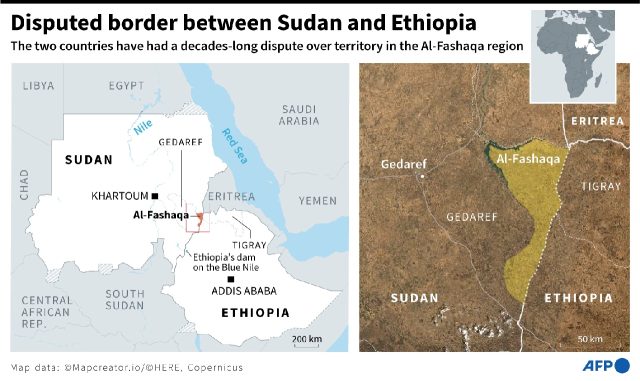Allegations that Ethiopian forces captured and killed Sudanese troops in a contested area along their border — charges denied by Addis Ababa — have revived a decades-old dispute over the fertile land.
The brinkmanship over Al-Fashaqa has alarmed regional leaders and fed into wider tensions between the rival powers of Sudan and Ethiopia over land and water in the Horn of Africa.
Deadly dispute
Khartoum announced on Monday it would recall its ambassador to Addis Ababa after accusing Ethiopia’s army of executing seven Sudanese soldiers and a civilian during a clash in Al-Fashaqa last week.
Sudan said the soldiers were “kidnapped from Sudanese territories” on June 22, taken into Ethiopia, and later “killed and their bodies publicly maimed”.
During a visit to the contested zone claimed by both countries, Sudan’s military leader Abdel Fattah al-Burhan instructed soldiers “to not allow any new movements or encroachments” on their soil.
The army, which has been in power since a coup in October 2021, vowed that the “perfidious act will not pass”.
Ethiopia’s army hit back, denying any role whatsoever in the killings, and vowing to drive Sudanese forces off any seized land if ordered.
Addis Ababa said the casualties resulted from a skirmish with a local militia and accused Sudanese forces of violating Ethiopian territory.
As the sabre-rattling intensified, the African Union and a grouping of regional leaders called for cool heads to prevail.
Ethiopian Prime Minister Abiy Ahmed issued an appeal in Arabic for calm and restraint “for the sake of our shared interests and good-neighbourliness”.
It is far from the first bloody incident in the restive strip of fertile land along the shared border.
In November, Sudan’s armed forces said six soldiers were killed in an attack by armed groups and militias linked to the Ethiopian military in Al-Fashaqa, allegations Addis Ababa again denied.
Blood and soil
Arguments over Al-Fashaqa, between two rivers where Ethiopia’s Amhara and Tigray regions meet Sudan’s Gedaref state, date back to colonial times.
Al-Fashaqa covers some 12,000 square kilometres (4,630 square miles), but analysts point to a flashpoint zone directly along the border, covering some 250 square kilometres (just under 100 square miles).
Treaties signed over a century ago during the colonial era drew the international boundary east of Al-Fashaqa, giving the land to Sudan.
But in the intervening decades, thousands of Ethiopian farmers have grown crops there during the rainy season, despite being periodically expelled by Sudanese forces.
Relations between Khartoum and Addis Ababa nosedived in 1995 after a failed attempt to assassinate Egypt’s then-president Hosni Mubarak while he visited Addis Ababa.
Ethiopia blamed Sudan for the attack and sent forces into Al-Fashaqa.
Since then, thousands of Ethiopian farmers have settled in the area, farming and paying taxes to Ethiopia.
Talks between Khartoum and Addis Ababa over the years have never produced a final deal on a border.
War and water
Al-Fashaqa borders Ethiopia’s troubled Tigray region, where deadly conflict erupted in November 2020 between federal forces and the Tigray People’s Liberation Front (TPLF).
The fighting sent tens of thousands of Ethiopian refugees fleeing into Sudan, exacerbating tensions between the two states.
Abiy has leaned heavily on security forces from his country’s Amhara region during the fighting, which has reached a stalemate as diplomats push for peace talks.
Many Amhara officials view Al-Fashaqa as rightfully theirs, and some analysts fear Abiy will struggle to rein in their territorial ambitions.
Sudan and Ethiopia both face daunting domestic economic and political challenges.
Aside from Tigray, Ethiopia faces internal unrest including in the Benishangul-Gumuz and Oromia regions.
Sudan has been under military control since October when Burhan took power in a coup, and mass street protests demanding a path to civilian rule have been violently broken up.
The border dispute over farming land also stirs anxieties over resources between the rivals, particularly stoked by Ethiopia’s mega dam on the Blue Nile.
Sudan believe the Grand Ethiopian Renaissance Dam threatens its water supply and along with Egypt, another downstream country, is pushing for a binding deal over its filling and operation.
Ethiopia has resisted pressure, and in February said it had begun producing electricity at the dam.

COMMENTS
Please let us know if you're having issues with commenting.